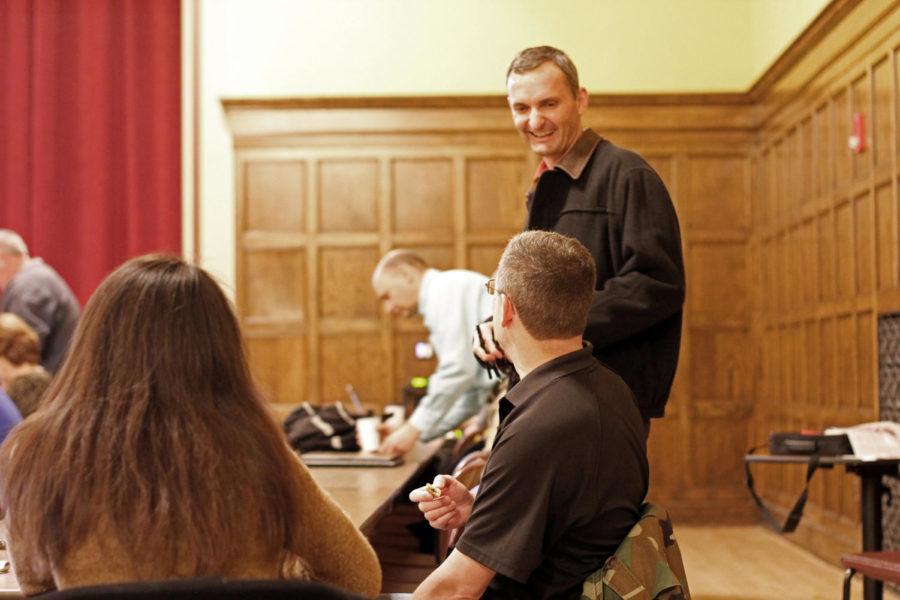Faculty Senate discusses safety, removal and addition of majors
A Faculty Senate member talks with another member before the monthly meeting Tuesday. The senate motioned for the removal of the botany major and the addition of the geographic information major.
December 8, 2015
The Faculty Senate met Tuesday to approve motions on the discontinuation of the botany graduate major, in addition to creating a new geographic information science minor.
At the meeting, Tim Bigelow, academic affairs council chairman and associate professor of electrical and computer engineering, read the second motion to discontinue the botany graduate major. He this particular major hasn’t had a student since 2003.
The second motion was to instill the geographic information science minor. After a unanimous agreement, both motions were adopted.
Kimberly Zarecor, associate professor in architecture, asked about the distribution of the money made by the tuition increase in regards to the higher amount of international students in the design college.
It was announced that the money from the tuition increase will be distributed to colleges based on how internationally-heavy each specific college is.
Rob Wallace, faculty senate president and associate president of ecology, evolution and organismal biology, welcomed Aaron Delashmutt, associate director of the Department of Public Safety, to discuss resources available to faculty and staff in regards to campus safety.
“I appreciate the opportunity to come and speak with you here,” he said. Delashmutt has been with the department for 20 years and is currently stepping in as interim chief.
Delashmutt opened with a quote from Capt. Edward Smith of the Titanic, reading: “I cannot imagine any condition which would cause a ship to founder. I cannot conceive of any vital disaster happening to this vessel. Modern ship building has gone beyond that.”
This quote stood in correlation with Delashmutt saying that he hopes Iowa State never has to go through a catastrophe, but, in the instance that it does, he hopes that faculty and staff, along with students, know what to do.
Delashmutt mentioned that he and the ISU Police Department are available at any time and would rather respond to a call that was a false alarm then not to respond to a call at all.
“We like to help; we like to meet people,” said Delashmutt.
Going into an office safety and security overview, Delashmutt discussed issues regarding reception staff considerations by posting signs and installing panic buttons around the office.
If faculty members ask for a safety overview, ISU Police will go into what is the best location for their desk, where their guests should sit and whether or not their should meet a guest in a general area.
“With recognizing and reporting disturbing behavior, we’ll go over the process of our threat assessment,” Delashmutt said.
This can be done through recognizing and reporting disturbing behavior training and violent incident response training. These trainings will give individuals options in surviving an active killer incident, present several scenarios based on real cases and provide tools on situational awareness and how to implement them into daily life.
“It’s okay to break things to get your own safety. You’re in that moment — you need to save your life or other,” Delashmutt said.
Wallace then read the announcements for the meeting, in which he discussed the policy on excused absences, the assignment of intellectual property rights, the completion of faculties’ conflict of interest and commitment statement and preparation for the next university’s strategic planning.
Jonathan Sturm, senate president-elect and professor of music and theater, then asked if any senators were looking to step into his position in the upcoming year.
“This is the time of year when we are looking for nominees for the president elect to succeed me,” Sturm said. “You become so involved in the campus as an organism, as a functioning community.”
Also discussed in the meeting was the recent Board of Regents decision to increase international tuition by $500 every year for the next three years.
The Faculty Senate’s next meeting will take place at 3:30 p.m. Jan. 8 in the Great Hall of the Memorial Union.

















